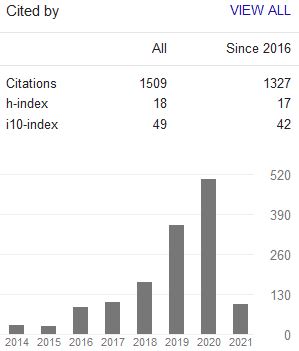THE ROLE OF CHENG HO MOSQUE: The New Silk Road, Indonesia-China Relations in Islamic Cultural Identity
Abstract
Keywords
Full Text:
PDFReferences
Books and Articles
Anderson, Benedict. Imagined Communities: Reflections on the Origin and Spread of Nationalism. London: Verso, 1983.
Dreyer, Edward L. Zheng He: China and the Oceans in the Early Ming Dynasty, 1405–1433. New York: Pearson Longman, 2007.
Fukuyama, Francis. Trust: The Social Virtues and The Creation of Prosperity. New York: The Free Press, 1995.
Hew, W. W. Negotiating Ethnicity and Religiosity: Chinese Muslim Identities in Post-New Order Indonesia. Unpublished PhD thesis, Australian National University, 2011.
----------. Cosmopolitan Islam and Inclusive Chineseness: Chinese-style Mosques in Indonesia In Religious Pluralism, State and Society in Asia. London and New York: Routledge, 2013.
Hoon, C. Y. Chinese Identity in Post-Suharto Indonesia: Culture, Politics and Media. Brighton, UK: Sussex Academic Press, 2008.
Mahfud, Choirul. Manifesto Politik Tionghoa di Indonesia. Yogyakarta: Pustaka Pelajar, 2013.
----------. “Lessons From Zheng He: Love of Peace and Multiculturalism.” Chia Lin Sien & Sally K Church (eds). Zheng He & the Afro-Asian World. Malaysia: PERZIM and the International Zheng He Society in Singapore, 2012.
Maulana, Rezza. Tionghoa Muslim/Muslim Tionghoa. Yogyakarta: IMPULSE, 2010.
Muzzaki, Akhmad, “Negotiating Identity: The Cheng Hoo Mosque and The Ethnict Chinese Muslim in Post-Soeharto Indonesia.” Chinese Southern Diaspora Studies, Volume 3, 2009.
----------. Cheng Hoo Mosque: assimilating Chinese culture, distancing it from the state. London, UK: Crise Working Paper No.71, January 2010.
Naisbitt, John & Doris. China’s Megatrends: 8 Pilar yang Membuat Dahsyat China. Jakarta: Gramedia Pustaka Utama, 2010.
Niam, Khoirun. “The Discourse of Muslim Intellectuals and `Ulama’ in Indonesia: A Historical Overview.” Journal of Indonesian Islam, Volume 04, Number 02, December 2010.
Pong, David (ed.). Encyclopedia of Modern China. USA: Gale, Cengage Learning, 2009.
Putnam, Robert D. Bowling Alone: The Collapse and Revival of American Community. New York: Simon and Schuster, 2000.
Suryadinata, Leo. Southeast Asian Chinese: The Socio-Cultural Dimension. Singapore: Times Academic Press, 1995.
----------. Laksamana Cheng Ho dan Asia Tenggara. Jakarta: Pustaka LP3ES, 2007.
Tanggok, M. Ikhsan. Menghidupkan Kembali Jalur Sutra Baru Format Baru Hubungan Islam Indonesia dan China. Jakarta: Gramedia Pustaka Utama, 2010.
Tan Ta Sen. Cheng Ho and Islam in Southeast Asia. Singapore: Institute of Southeast Asian Studies, 2009.
Wijayakusuma, Hembing. Muslim Tionghoa Cheng Ho. Jakarta: Yayasan Obor Indonesia, 2000.
Electronic Sources
Seasiaphotography.wordpress.com. Accessed on 2 September 2013.
http://id.berita.yahoo.com/habibie-muslim-indonesia-china-dapat-pererat-hubungan-114503240.html. Accessed on 8 November 2013.
http://www.republika.co.id/berita/dunia-islam/islam-nusantara/10/07/21/125645-pameran-islam-cina-pererat-hubungan-indonesia-cina. Accessed on 8 October 2013.
http://www.antaranews.com/print/212895/. Accessed on 8 November 2013.
http://indonesian.cri.cn/201/2013/10/03/1s142384.htm. Accessed on 8 November 2013.
http://hardikadwihermawan.blogspot.com/2012/04/pesona-dan-gaya-arsitektur-masjid-cheng.html. Accessed on 2 September 2013.
http://banjarmasin.tribunnews.com/2012/09/01/masjid-cheng-ho-dibangun-di-jalan-rk-ilir. Accessed on 1 September 2013.
http://www.nu.or.id/a,public-m,dinamic-s,detail-ids,2-id,42465-lang-,id-c,daerah-t,Masjid+Cheng+Hoo+Jember+Segera+Rampung-.phpx. Accessed on 2 September 2013.
http://risalahmutiaratauhid.blogspot.com/2013/07/masjid-cheng-ho-surabaya-pandaan.html. Accessed on 2 September 2013.
http://www.wego.co.id/berita/wisata-sekaligus-ibadah-di-masjid-cheng-ho-surabaya/. Accessed on 2 September 2013.
http://regional.kompas.com/read/2011/07/24/2119416/Masjid.Cheng.Hoo.Simbol.Keterbukaan. Accessed on 1 September 2013.
http://www.republika.co.id/berita/video/bincang-tokoh/13-/11/04/¬mvqioe-din-agama-paling-dekat-dengan-budaya-cina-adalah-islam. Accessed on 8 November 2013.
http://www.thejakartapost.com/news/2013/07/28/cheng-ho-mosque-a-symbol-peace.html. Accessed on 8 November 2013.
Interviews
Interview with HMY. Bambang Sujanto, Surabaya, 12 September 2013.
Interview with Sidharta Adhimulya, Surabaya, 8 September 2013.
Interview with Liem Ou Yen, Surabaya, 12 Agustus 2012.
Interview with Tofan Hidayat, Surabaya, 18 September 2013.
Interview with Haryono Ong, Surabaya, 21 September 2013.
DOI: 10.15642/JIIS.2014.8.1.23-38
Refbacks
- There are currently no refbacks.
Indexed by:
Journal of Indonesian Islam (ISSN 1978-6301 and E-ISSN 2355-6994) is published by the Postgraduate Program (PPs) and the Institute for the Study of Religion and Society (LSAS), State Islamic University (UIN) of Sunan Ampel Surabaya.
Journal of Indonesian Islam by http://jiis.uinsby.ac.id/index.php/JIIs/index is licensed under a Creative Commons Attribution-ShareAlike 4.0 International License.
Copyright ©2020 State Islamic University (UIN) of Sunan Ampel Surabaya. Powered by Public Knowledge Project OJS.







